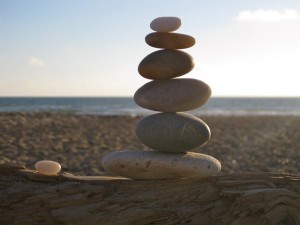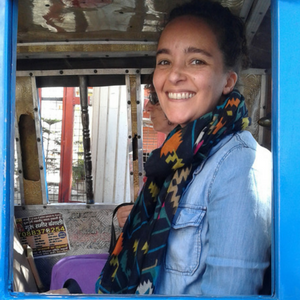“Meditation is not evasion; it is a serene encounter with reality.” ~ Thich Nhat Hanh
I’ve been practicing meditation for more than two years, and I come to this realization each and every time I sit: Meditation meets us where we’re at in life, opening and strengthening our hearts and minds where they most need to be.
As Eknath Easwaran and other masters have pointed out, meditation can’t be understood from an intellectual  standpoint. It’s by practicing that we develop the calm and wisdom needed to move through life with grace and ease, to bring greater peace into the world.
standpoint. It’s by practicing that we develop the calm and wisdom needed to move through life with grace and ease, to bring greater peace into the world.
None of us is born enlightened—we all have a context that shapes who we are and become. Childhood poverty and rape deposited stones in my heart, hardening me in ways I couldn’t see or feel until I began meditating at the age of 39. Through my practice sessions, I regularly confront and dislodge these stones. Each extraction leads me to a fresh sense of freedom.
With each stone-plucking, I also gain a more profound compassion for others: it’s by seeing and feeling the contours of my own stonework that I can truly comprehend the ways in which life bestows difficulties upon everyone. Compassion means to suffer with. The word evolved from the Latin roots of com, or with, and patī, to suffer. In these terms, suffering connotes the basic ups and downs all of us go through just by the nature of being alive.
None of us escapes pain, upsets, or failures. They’re factors of life. But some of us are so saddled by emotional burdens that we can’t feel a deeper love for ourselves or others. As a society, it would behoove us to provide everyone accessible, supportive ways to confront and transform our life wounds. It’s an important piece of the Constructive Program pie, because societal harmony depends on widescale healing and compassion, the very masonry of cooperation.
I’ve heard from people who don’t meditate that I’ve got my head in the clouds—all that sitting accomplishes nothing but self-absorption, they say. My response? Meditation isn’t about creating our own private bliss bubbles. It’s about ameliorating our suffering and making spiritual leaps so that we can fearlessly serve humanity in our own loving ways.
For some of us that might mean being more present with our children or life partners; for others of us that could look like speaking truth to power, committing civil disobedience, building economic alternatives. No matter how small or large the role, each contribution matters. As poet Clarissa Pinkola Estes writes:
Ours is not the task of fixing the entire world all at once, but of stretching out to mend the part of the world that is within our reach. Any small, calm thing that one soul can do to help another soul, to assist some portion of this poor suffering world, will help immensely. It is not given to us to know which acts or by whom, will cause the critical mass to tip toward an enduring good.
Time and again, it’s the meditation that reminds me to strengthen my capacity for compassion and love—and to forgive myself when I slip and reenact ingrained patterns. It also helps me remember that the smallest actions can serve others in the most heart-inspired ways. On any given day, our greatest contribution in life could be bringing a smile to a stranger’s face. We never know: one smile could be the action that tips us toward enduring good, the peace we’re all looking for.
Addendum: If you’re wondering how to bridge your meditation practice with peacemaking work, you’ll find inspiration in Michael Nagler’s Meditation for Peacemakers. This insightful e-book covers a lot of historical-spiritual ground.








